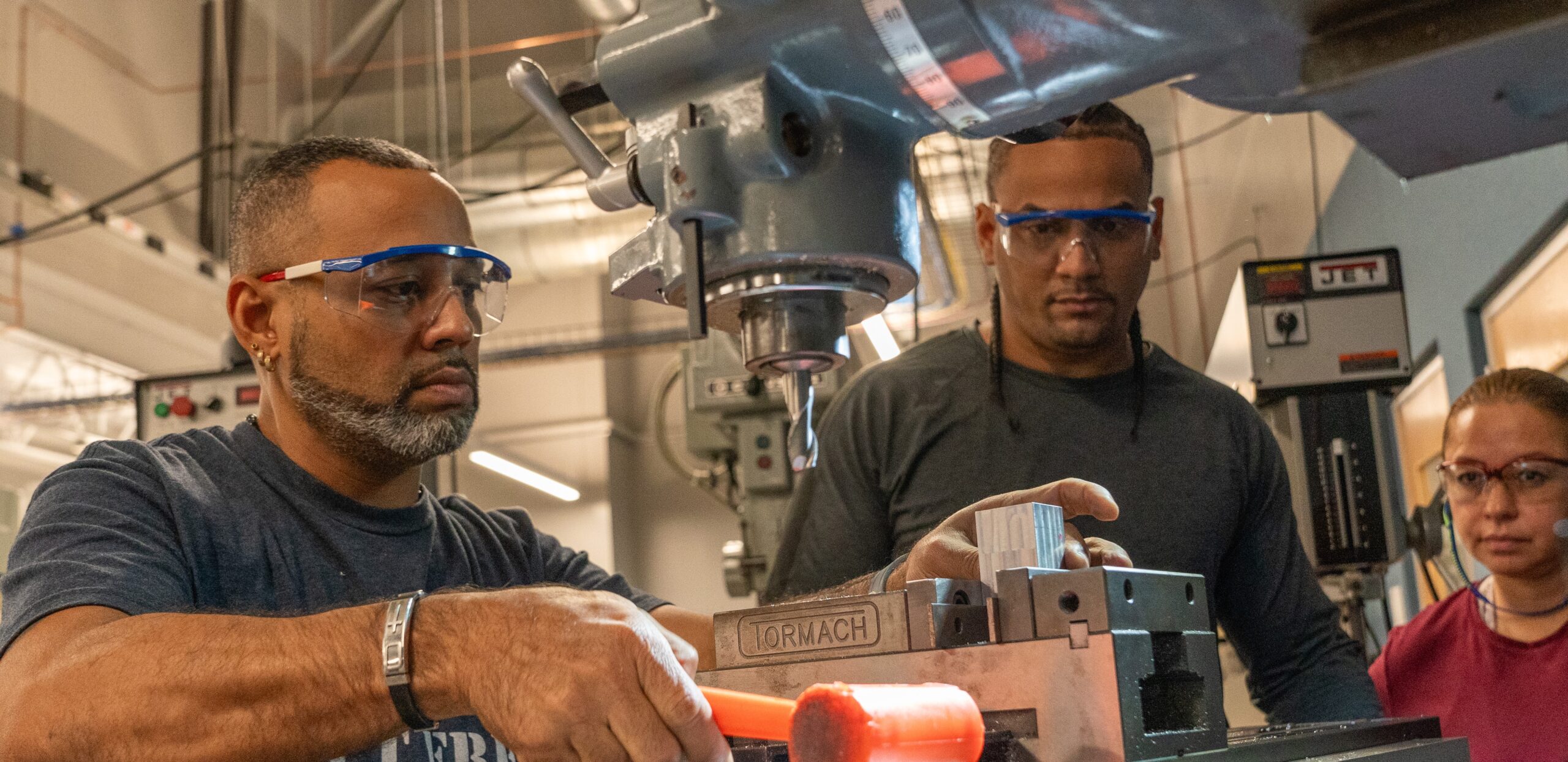What You Will Learn
The Electronics Engineering Technology prepares you for diverse career paths in industries such as telecommunications, manufacturing, energy and more. The associate degree program emphasizes practical, hands-on experiences, allowing you to work with real-world electronic devices and systems. This hands-on approach enhances problem-solving skills and prepares you for the practical challenges you may face in your career.
Electronics Engineering Technologists often work closely with engineers, contributing their technical expertise to the design, testing and maintenance of electronic systems. This collaboration provides a multidisciplinary approach to problem-solving. Thus, the program emphasizes problem-solving and critical thinking skills, essential for diagnosing and solving complex issues in electronic systems and devices.
Curriculum
Our Electronics Engineering Technology program includes a 40-credit core of courses such as Circuit Analysis, Circuit Measurement and Fundamentals, Active Circuit Components and Design, Digital Principles and Microprocessors, Electronic Fabrication, Electronic Communication Systems, Computer-Aided Drafting and Technical Physics.
Careers in the Field
Electronic engineering technologists and technicians work on teams with electrical engineers. They may work in offices, laboratories, or factories in the following jobs.
The Electronics Engineering Technology program at CCM produces graduates that are employed and operate effectively in these positions:
- Clinical Operations Manager
- Control Automation/Technician
- Controls Engineer
- Electrical Technicians
- Equipment Managers
- Health Technology Managers
- Information Technology Developers
- Quality Control Operators
- Senior Technical Support Engineer
According to the U.S. Bureau of Labor, the median annual wage for electrical and electronic engineering technologists and technicians in 2022 was $66,390. CCM graduates have also successfully transferred to complete a baccalaureate degree in electronics engineering technology.
Why Study Electronics Engineering Technology at CCM?
Cutting-edge training AND hands-on experience!
- The curriculum is designed to align with industry standards and technological advancements, ensuring that students are equipped with the latest knowledge and skills needed in the electronics field.
- Core electronic courses sequenced along with applied mathematics and science help you develop a broad background in the technology.
- Each electronics course contains a laboratory which utilizes modern test instruments and applies classroom theory to practical applications.
- Studying Electronics Engineering Technologyat CCM stimulates your creativity and encourages innovation in designing and improving electronic systems.
- The faculty in the Electronics Engineering Program at CCM have many years of teaching and industry experience.
- This program is accredited by the Engineering Technology Accreditation Commission of ABET.
Paying For Your Electronics Engineering Technology Education
Earning a Degree in Electronics Engineering Technology is a powerful investment that will pay off over the course of your life, in both increased earnings and job satisfaction. But what is the upfront cost, and how do you afford it?
There’s good news: Scholarship opportunities are available! In addition to the general scholarships available at the college, Glenbrook Technologies, NDIA John Amerspek, NDIA Rodney Frelinghuysen and NDIA Dean Gallo offer scholarships.
Please contact the Department of Engineering Technology and Engineering Science for more information.
Featured Courses
Industrial Electronics
This course covers operational amplifiers in linear, non-linear and active filter applications, pulse and wave-shaping techniques, power supplies and regulators, thyristor control of power and transducers. The laboratory includes experiments in design and tests to support the above topics
Active Circuit Design
This course covers analysis and design of solid-state amplifiers using bipolar and field effect transistors. Topics include frequency response using Bode plots and feedback analysis as applied to operational amplifiers and oscillators. Laboratory verification includes transistors, amplifiers, power amplifiers, IC operational amplifiers and oscillators
Circuit Analysis DC/AC
This course introduces the student to both DC and AC circuit theory. It includes Ohm’s and Kirchoff’s laws for analysis of series and parallel circuits. Computer circuit simulation of series-parallel, ladder and bridge networks in both DC and AC are analyzed. Resonance and frequency response are included along with some discussion of AC power and transformers. The laboratory experiments are designed to support the theory and obtain measurement skills
Your Electronics Engineering Technology Faculty Advisor
Thomas Roskop Department Chairperson / Associate Professor
Email: troskop@ccm.edu
Office: Advanced Manufacturing & Engineering AME104
Office hours: T/TH 10:30-12:00
Phone: 973-328-5766
Department: Engineering Technologies/Engineering Science
Raed Awawdeh Assistant Professor
Email: rawawdeh@ccm.edu
Office: Advanced Manufacturing and Engineering 120
Office hours: M 2:00 pm-3:30 pm/W 11:00 am-12:30 pm
Phone: 973-328-5761
Department: Engineering Technologies/Engineering Science
Accreditation
This program is accredited by the Engineering Technology Accreditation Commission of ABET.



